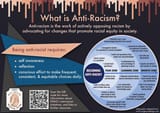Search Results
ID: 7BJmb0vK/pol/511157498#511157748
7/23/2025, 9:07:19 PM
Encouraging people who hold racist beliefs to reflect and change requires a different approach—one rooted in self-examination, dialogue, and structured recovery frameworks. Begin by inviting doubt: questions like “Why blame only one group?” or “What internal narrative justifies ‘they deserve it’?” can begin to fracture the certainty of extremist beliefs. Dialogue should focus on listening, not lecturing. By asking open-ended, Socratic questions—“What evidence would shift your view?”—you engage the rational mind rather than triggering emotional resistance.
Peer influence plays an outsized role in belief formation and transformation. Extremist beliefs often thrive in echo chambers—online communities or social groups that only reinforce a single narrative. Research shows that algorithm-driven social media platforms can amplify this effect, creating environments where individuals become isolated from alternative viewpoints. Echo chamber dynamics distort perceptions, intensify hostility toward “others,” and lock people into rigid ideological worlds. Media literacy and critical thinking become essential tools for inoculating against these echo chambers: recognizing filter bubbles, identifying disinformation, and questioning “us-versus-them” narratives can begin to break the feedback loop of extremist content.
(2)
Peer influence plays an outsized role in belief formation and transformation. Extremist beliefs often thrive in echo chambers—online communities or social groups that only reinforce a single narrative. Research shows that algorithm-driven social media platforms can amplify this effect, creating environments where individuals become isolated from alternative viewpoints. Echo chamber dynamics distort perceptions, intensify hostility toward “others,” and lock people into rigid ideological worlds. Media literacy and critical thinking become essential tools for inoculating against these echo chambers: recognizing filter bubbles, identifying disinformation, and questioning “us-versus-them” narratives can begin to break the feedback loop of extremist content.
(2)
Page 1
